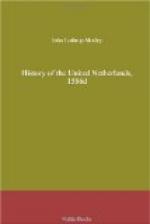to look into the state of Netherland affairs.
Leicester having expressly urged the importance of
selecting as wise a politician as could be found—because
the best man in England would hardly be found a match
for the dullards and drunkards, as it was the fashion
there to call the Dutch statesmen—had selected
Wilkes. After fulfilling this important special
mission, he was immediately afterwards to return to
the Netherlands as English member of the state-council,
at forty shillings a-day, in the place of “little
Hal Killigrew,” whom Leicester pronounced a
“quicker and stouter fellow” than he had
at first taken him for, although he had always thought
well of him. The other English counsellor, Dr.
Bartholomew Clerk, was to remain, and the Earl declared
that he too, whom he had formerly undervalued, and
thought to have “little stuff in him,”
was now “increasing greatly in understanding.”
But notwithstanding this intellectual progress, poor
Bartholomew, who was no beginner, was most anxious
to retire. He was a man of peace, a professor,
a doctor of laws, fonder of the learned leisure and
the trim gardens of England than of the scenes which
now surrounded him. “I beseech your good
Lordship to consider,” he dismally observed to
Burghley, “what a hard case it is for a man that
these fifteen years hath had vitam sedentariam, unworthily
in a place judicial, always in his long robe, and
who, twenty-four years since, was a public reader in
the University (and therefore cannot be young), to
come now among guns and drums, tumbling up and down,
day and night, over waters and banks, dykes and ditches,
upon every occasion that falleth out; hearing many
insolences with silence, bearing many hard measures
with patience— a course most different
from my nature, and most unmeet for him that hath
ever professed learning.”
Wilkes was of sterner stuff. Always ready to
follow the camp and to face the guns and drums with
equanimity, and endowed beside with keen political
insight, he was more competent than most men to unravel
the confused skein of Netherland politics. He
soon found that the Queen’s secret negotiations
with Spain, and the general distrust of her intentions
in regard to the Provinces, were like to have fatal
consequences. Both he and Leicester painted the
anxiety of the Netherland people as to the intention
of her Majesty in vivid colours.
The Queen could not make up her mind—in
the very midst of the Greenwich secret conferences,
already described—to accept the Netherland
sovereignty. “She gathereth from your letter,”
wrote Walsingham, “that the only salve for this
sore is to make herself proprietary of the country,
and to put in such an army as may be able to make head
to the enemy. These two things being so contrary
to her Majesty’s disposition— the
one, for that it breedeth a doubt of a perpetual war,
the other, for that it requireth an increase of charges—do
marvellously distract her, and make her repent that
ever she entered into the action.”




